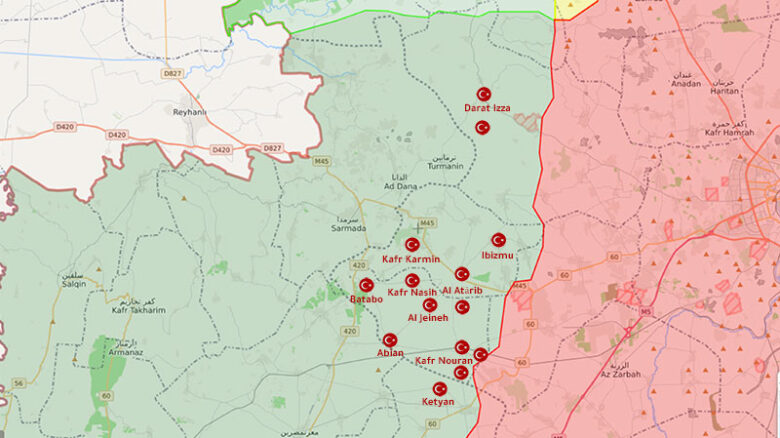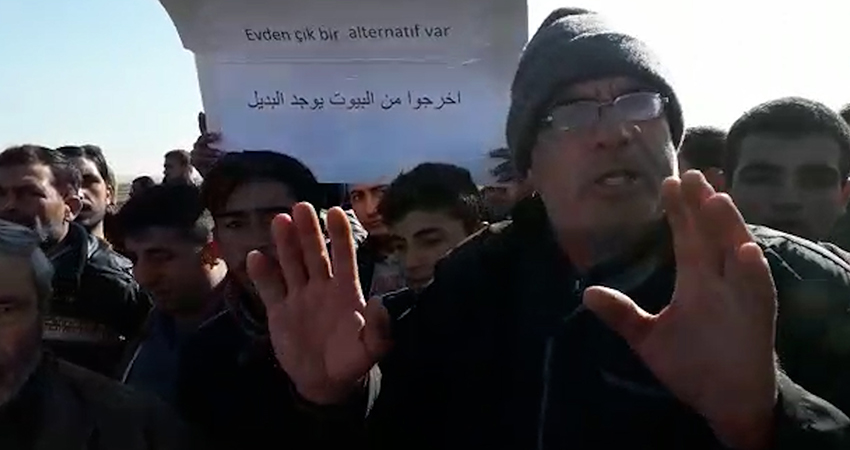Executive Summary
In 2017, Turkey signed the Astana de-escalation agreement in Northwestern Syria and established several observation posts across the region. However, the agreement collapsed when Syrian-Russian forces progressed to territories overseen by these posts. On 5 March 2020, Turkey signed a second agreement with Russia, called the Moscow ceasefire agreement. As a result of the new agreement, the Turkish military boosted its presence in the provinces of Idlib and Aleppo. Syrians for Truth and Justice (STJ) has been monitoring the increasing Turkish military mobilization in Syria, previously publishing a report documenting the deployment of Turkish forces to over 53 locations in the areas south of Idlib,[1] including the Mount Zawiya region.
In this report, STJ covers similar Turkish deployments in the western countryside of Aleppo, where the Turkish army established 11 military posts. STJ also cites locals who confirmed that Turkish forces were stationed in at least four schools, disrupting classes. Additionally, interviewed locals told STJ that Turkish forces seized civilians’ houses and agricultural lands against their will and held onto their positions in these properties despite their owners’ requests for them to leave.
-
Turkish Military Posts in the Western Countryside of Aleppo Province
Turkish forces were deployed to 11 locations throughout the western countryside of Aleppo province, controlled by the military faction Hayat Tahrir al-Sham (HTS). The forces were accompanied by the military group that Turkey recently founded and called al-Quwat al-Radifa (Auxiliary Forces).[2] In cooperation with local activists, STJ mapped out the locations of these military posts:
- Batabo Military Pots: Turkish forces established the post in Batabo town and took positions in the town’s school. The post is a station for approximately 300 soldiers and 25 different military machines.
- Abian Sam’an Military Post: Turkish forces established the post south of the town and took positions in civilian houses. The post is a station for approximately 450 soldiers and 30 different military machines.
- Atarib Military Post: Turkish forces established the post east of the town and took positions in its eastern neighborhood (al-Sharqiya neighborhood), particularly in the building of the al-Sharqiya Boys School. The seized school building included the offices of the Directorate of Education of the Ministry of Education, operated by the Syrian Interim Government (SIG). Both the directorate and the school were evacuated to be used for military purposes. Turkish forces also used civilian houses near the school and blocked a nearby road leading to the post’s location. The post is a station for approximately 500 soldiers and 25 different military machines.
- Asa’i Military Post: Turkish forces established a large post south of Atarib city. The post is a station for approximately 500 soldiers and 30 different military machines.
- Kafr Naseh Military Post: Turkish forces took positions in civilian houses north of the village. The post is a station for approximately 200 soldiers and 15 different military machines.
- Ketyan Military Post: Turkish forces took positions in the eastern neighborhood of the village, particularly in Ketyan School and civilian houses.
- Al-Jinah Military Post: Turkish forces were deployed across over 10 hectares of civilian agricultural lands. The post is a station for approximately 300 soldiers and 25 different military machines.
- Kafr Karmin Military Post: Turkish forces took positions between the two villages of Kafr Karmin and Kafr Naseh across civilian agricultural lands. The post is a station for approximately 400 soldiers and 20 different military machines.
- Darat Izza Military Post: Turkish forces constructed took positions south of the town in a building and tents they constructed there. The post is a station for approximately 200 soldiers and 20 different military machines. Additionally, Turkish forces were deployed nearby to Mount Sheikh Barakat. The second post is a station for 300 soldiers and 30 different military machines.
- Military Posts in Kafr Nouran:
- Turkish forces took positions in the Kafr Nouran School building. The post is a station for approximately 500 soldiers and 30 different military machines. The forces installed machine guns on the school’s rooftop.
- Turkish forces took positions between civilian houses. The post is a station for approximately 50 soldiers, two tanks, and light military machines.
- Turkish forces took positions in civilian agricultural lands. The post is a station for approximately 200 soldiers and 20 different military machines.
- Al-Abzmo Military Post: Turkish forces took positions in civilian houses east of the village. The post is a station for approximately 400 soldiers and 23 different military machines.

Image 1 – Map locating Turkish military posts in the western countryside of Aleppo province, controlled by opposition armed groups.
-
The Impact of the Deployment of Turkish Forces in Aleppo’s Western Countryside
Under the March 2020 Moscow Agreement, the Turkish military turned several civilian structures and agricultural lands in Aleppo’s western countryside into military posts. Turkish forces used these structures without their owners’ permission and despite their repeated demands that they leave their private properties.
Field researchers with STJ reported that Turkish forces took positions in four school buildings in the western countryside of Aleppo. Each of these schools once accommodated 500 elementary or middle school students. Seized education facilities included al-Sharqiya Elementary School in Batabo town, Atarib al-Sharqiya School near Atarib city, Ketyan Village School, and Iqraa School in Kafr Nouran village.
Several residents of occupied towns and villages told STJ that using school buildings for military purposes by Turkish forces disrupted classes. Consequently, some students were forced to complete courses in schools in adjacent villages that are already stretched beyond their capacity and overcrowded with students. Others had to drop out of school because their parents could not provide transportation or afford the cost of sending their children to schools outside their villages.
A Batabo School teacher, who requested to be anonymous, commented on the status of education in his village. He told STJ’s field researcher:
“In early February 2020, the Turkish army stationed forces in the Batabo Martyrs Elementary School. About 760 students, from first to sixth grade, were deprived of education. The army brought approximately 400 soldiers into the school, in addition to 30 military machines, including tanks and vehicles. Additionally, soldiers denied students and teachers access to the school building, saying that the facilities were now a military post. Turkish forces also did not permit the school administration staff to remove the school furniture and supplies to another location in the attempt to resume classes. Despite the locals’ protest, the administration was not allowed to even take desks or furniture from the administration’s office or the library.”
He added:
“When the 2020-2021 school year kicked off, students were redistributed to nearby schools, according to their classroom capacity. Students were assigned evening classes in these schools. The majority of the seized school’s students are taking classes in the building of the Baraem al-Thawra school. Even though it is the original administration that is overseeing the process, relocated students are forced to attend evening classes because the school building is occupied by its registered students in the morning. Other students were forced to abandon classes because the schools they were relocated to are too distant. Students dropped out only because the Turkish army seized their school facilities.”
Pertaining to the use of Turkish forces of civilian houses and agricultural lands for military purposes, a field researcher with STJ interviewed a group of locals from the two towns of al-Jinah and Kafr Nouran, as well as several activists in the town of Abian Sam’an and the city of Atarib. Evidence and testimonies confirmed that Turkish forces vandalized the houses and lands they seized and refused to leave any of the privately owned properties, many which they have been using now for over a year Additionally, locals said that Turkish forces continue to seize new houses. The most recent house seizure occurred in al-Wasta village, in Atarb city suburbs in March 2021.
An al-Jinah-based farmer, called Abu Abdulrahman, told STJ’s field researcher:
“My brothers and I own agricultural land in the town of al-Jinah. When Turkish forces entered the village, they stationed themselves in several of my neighbors’ agricultural lands without their permission. They took positions across 10 hectares. The problem was not that they turned the lands into a military post, but that they bulldozed the soil, damaged the lands, and used the soil to establish a large dirt mound around the post. These lands are today inarable and would take at least four years to be rehabilitated into what they used to be.”
The farmer added:
“Turkish forces also took part of my land and prevented me from cultivating the remaining swathes, which are still arable. This land was our source of living. We used to cultivate it three or four times a year. But now we are left with nothing. Turkish soldiers did not allow farmers to take any of their agricultural equipment, such as irrigation water sprinklers, generators, power line wires, and wells’ water pumps. The equipment was abandoned without use or maintenance. Turkish forces damaged and destroyed most of the equipment as they established the dirt mound around the military post. The machinery and the bulldozer the forces used to bulldoze the soil ran over sprinklers and irrigation networks and destroyed them completely.”
A civilian from Kafr Nouran village, Muhammad, known as Abu Radwan, told STJ’s field researcher:
“We were displaced when large Turkish military convoys entered our village. We thought that they would only pass through and ultimately station themselves in Atarib city. However, they took positions in 3 places within the village. They first seized the village’s school and a nearby neighborhood. Then, they turned to agricultural lands adjacent to the village before they settled in lands within it. These lands are mine and my neighbors’.”
He added:
“There were over 40-year-old fruit trees in my land. They uprooted all the trees and raised a dirt mound. When we returned to the village after we had fled and saw what they did to the lands, we went to the military post and spoke with the guards there. Turkish soldiers said that the area has become a military zone and it is forbidden to approach it. When we asked them to allow us to take uprooted trees to use them as firewood, they refused. My land extends over 8 dunums, all cultivated with fruit trees. I lost them all.”
On 22 January 2021, in the Abian Sam’an town, a group of locals held protests for four days in front of the military post Turkish forces had set up in their area. They demanded that soldiers leave civilian houses and find another abandoned place to establish a station. However, Turkish forces did not respond to their requests.
______
[1] “Idlib: Turkish Forces Stationed at Civilian Properties Against Their Will,” STJ, 29 April 2021, https://stj-sy.org/en/idlib-turkish-forces-stationed-at-civilian-properties-against-their-will/ (last visited: 30 April 2021).
[2] “The Auxiliary Forces Formed to Boost Turkey’s Military Presence in Idlib,” STJ, 20 April 2021, https://stj-sy.org/en/the-auxiliary-forces-formed-to-boost-turkeys-presence-in-idlib/ (Last visited: 30 April 2021).

